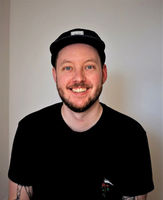Talking about Poetry with the 2017 RBC Bronwen Wallace Award Nominees
The RBC Bronwen Wallace Award for Emerging Writers (administered by the Writers' Trust of Canada) has an all-star list of past winners and nominees, including names like Madeleine Thien, Jeramy Dodds, and Michael Crummey.
This year's finalists look to be more than ready to take up that mantle. We're excited to speak with Tyler Engström, Domenica Martinello, and Noor Naga about their nominated poems -- the pieces which have marked them as young writers to watch closely. They tell us what they love about writing poetry (its "skinlessness"), what being nominated for the award means to them as young writers, and the Canadian poems they would recommend to readers.
The winner of the $10,000 prize (which alternates each year between poetry and prose) will be announced at a public event in Toronto on May 30, 2017. Click here for more details if you'd like to attend.
If you want a glimpse at the work of these future stars, you can read the nominated pieces yourself; they're available for free download on the iTunes store.
Open Book:
Tell us about the work for which you were shortlisted, and when it was written.
Tyler Engström:
after thoughts is a collection of poems I wrote between 2015 and 2017 that all speak to these outwardly insignificant but inwardly compelling moments in time. I love micro-events and how we process them, and how singular, seemingly unrelated moments can speak to entire lives and relationships. I’m more interested in considering how things that seem mundane or meaningless can trigger these waves of thought that immediately transcend whatever inspired them. Those moments when, let’s say you’re standing there in the kitchen, looking in the fruit bowl at this rotting lemon that you totally forgot about, and suddenly you think “damn… is this lemon actually me?” The poems in after thoughts are about that.
Domenica Martinello:
The first inklings of the poems in All Day I Dream About Sirens emerged while taking a workshop with Jay MillAr through the Toronto New School of Writing in 2015. The workshop was focused on the long poem, and the project began as a cycle voiced by the Starbucks Siren. I was fascinated by how a corporate logo had, in a sense, been superimposed over a complex, feminized mythology. The ubiquitous Siren logo herself has been reworked, redesigned, and desexualized over the last 40 years to better align with Starbucks branding. And so the branding and rearranging of women’s bodies also found their roots in the work.
Though the Starbucks Siren doesn’t quite surface in the shortlisted selection, the project is kind of a whirlpool—everything gets sucked in.
Noor Naga:
The Mistress and the Ping is an excerpt from a tripartite novel-in-verse entitled The Mistress Washes Prays, and it is about a young Muslim woman in Toronto who becomes romantically involved with a married man. In this work, the protagonist, Khadija (otherwise known as Coocoo), meets her mirror image at the critical moment that her faith is already worn threadbare. As an immigrant and hijabi woman in a major North American city, she rings in low on the hierarchy of desirability. After years of bargaining with God to end her loneliness and receiving no answer, her desperation finally overwhelms her patience. She steps outside of herself. She makes a home out of a man who already has one of his own.
Stylistically, The Mistress Washes Prays is the spawn of two rogue poetic traditions: the first being narrative-experimental à la Anne Carson, Michael Ondaatje, Maggie Nelson; and the second being religious-ecstatic—think post-conversion Leonard Cohen, ee cummings, Franz Wright, and the many medieval sufi saints who swallowed the name of God and set themselves on fire. Romantic affairs are always representational, and in the case of Coocoo, they represent the pinnacle of an abandonment crisis. Finding herself spiritually orphaned, after years of patient devotion, Coocoo latches at the breast of a new deity in the form of middle-aged professor and father of two, Muhammad.
Your CanLit News
Subscribe to Open Book’s newsletter to get local book events, literary content, writing tips, and more in your inbox
The Mistress and the Ping, an excerpt of which was shortlisted for the 2017 Bronwen Wallace Award, is the third and final section of the work. It chronicles Coocoo’s spiraling descent: the transformation of her love into something at first desperate and obsessive, then finally cringing and animal, utterly without grace. It explores the growing contradictions of being a practicing Muslim woman, still clinging to her five daily prayers, even as she gives her body to a man who cannot keep it. What does it mean to carry condoms beside the halal soy sauce in your purse? How long can a homeless love survive on the streets before it begins to hallucinate? These are some of the questions this poem series swishes around in its mouth.
OB:
What do you love most about writing poetry?
TE:
In a way, you can do whatever you want. There are deep, historic roots in different forms, but poetry lends itself so well to different movements and interpretations. The fact that contemporary artists like Rupi Kaur or Derek Beaulieu exist in the same sphere as Coleridge or Wordsworth is wild. So different, but there are clear lines of connection running through all of these different styles and forms. I love writing poetry because I feel it gives you the biggest opportunity to show respect to a form but say, “here’s how I interpret the spirit of that.” I feel like prose has give, but you can flex poetry a lot further as long as you show it respect. Most of all, I’m into the challenge of using the play between sounds and images and metaphors I find interesting to tell these really layered stories in as few words as possible.
DM:
It’s hard to describe—both my love for poetry, and poetry itself, which makes me it love it more. I love struggling with language: Stretching and rearranging it, the play, possibility, and transformation. There are rules, there are no rules. I value the constant surprise.
NN:
That it moves sideways instead of forward.
OB:
Tell us a little about where you are in your writing life currently. What does being nominated for the award at this stage mean to you?
TE:
It’s huge. The nomination was announced not long after I lost my job and I was in the doldrums, thinking, “what’s next, how do we pay the bills, how do I afford my last year of university?” It just came at the perfect time to remind me that work will come, but not to lose focus on writing. I’d only decided in 2016 to start sharing my poetry (I’d done some non-fiction, reviews, interviews and editorial stuff before that) so to be published and nominated for this award in the span of months… it’s incredible. It’s an entirely different feeling compared to publishing a review or producing something for a client because there’s a lot more of “you” in it, obviously. It’s validation that the love I give to it comes back, and that’s an amazing feeling.
DM:
I currently have one year of my MFA at the Iowa Writers’ Workshop under my belt, and have completed a draft of my poetry manuscript (also called All Day I Dream About Sirens). Each poem in the draft has had a long and varied life, but it’s the first time I’ve compiled them all together. It’s been exciting to help the collection find its own particular tune and inner logic.
The momentum, support, and mentorship that accompany this award nomination are priceless. I’ve been trying to take risks and challenge myself with what I’ve been writing, so it’s especially heartening to then be recognized for that labour. In my mind, the nomination is a step toward ensuring that I can keep doing what I love with sustainability and longevity (and help others do it, too).
NN:
Last September I finished my first manuscript, a literary novel set in an all girls’ high school in Dubai, where the pictures of pigs are blacked out of textbooks for being considered un-Islamic. It took five years to write this novel. I finished it, and then promptly nosedived into a depression. Over the next few months, when I could rouse myself from my catatonic state, I sent over sixty query letters to literary agents before finally forcing myself to stop. I’d like to be able to say that my confidence was unshaken by the steady fork-and-knife clatter of rejections in my inbox (or worse, the silence), but the truth is that it was a low I had never lived before.
When I finally began to write again, I found I no longer had the tolerance for fiction. Poetry, however, with its skinlessness, with its wiggly looseness and lateral logic appealed to me. I needed a different temperature to work with, something closer to my own distraction or delirium. So much of writing is solitary and thankless, ridiculous even, an exercise in delayed gratification and self-doubt. You can swim so far out in a project that you are surrounded by water, with no visible shoreline ahead or behind you. I don’t know any writers who haven’t, at some point in their careers, thought to stop thrashing around. The rare moments in which we celebrate our work through publication, awards, or readings, however, make a difference; they can keep us afloat. What does being nominated for the Bronwen Wallace mean to me at this time? It means a buoy, and for that I am grateful.
OB:
If you were to recommend one Canadian poem to readers, what would you choose and why?
TE:
There are so many amazing Canadian writers, including some really inspiring Calgary-based poets with recent books like Micheline Maylor’s Little Wildheart and Richard Harrison’s On Not Losing My Father’s Ashes in the Flood. Must reads, go buy them. But if I had to choose just one poem right now from the vastness of Canadian literature, it has to be David McGimpsey’s “Blackberry” from his book Asbestos Heights. There are a huge number of poems I enjoy out of that book, but “Blackberry” is a great example of the kind of contemporary Canadian poetry I can’t get enough of. It’s funny, distinct, layered, and waves off certain poetic conventions. Plus it name drops Jesus and Diet Sierra Mist Kiwi, which sounds refreshing and calorie conscious. Very tight.
DM:
“Discourse on the Logic of Language” by M. NourbeSe Philip (which we are fortunate to have access to via YouTube—please experience it!). It’s a poem that reveals the violence and anguish of the English language as a colonizing force—yet there is beauty and power in Philip’s reclamation and repetition. The poem rhythmically cycles through several registers and incorporates various texts and speech acts. There’s edict, address, folklore, questionnaire, scientific text, and more, all interwoven to create new possibilities in the mind and on the tongue. The “discourse” lives in the body.
Also, I love how the poem has two lives—on the page and in performance, with no clear hierarchy as to which order the parts should be read in. To me, this poem represents the wide-ranging diversity, variety, experimentation, ethics, and excitement possible in Canadian poetry.
NN:
My favourite Canadian poetry collection is Autobiography of Red by Anne Carson because reading it made me stop for the first time and ask the question: is poetry just prose broken up into lines? It seems to me that there is something uniquely Canadian about this flamboyant disregard for genre-divisions. There is little reverence, but also little anxiety about calling George Elliott Clarke’s I & I poetry and calling Kim Thúy’s Ru prose, or calling Michael Ondaatje’s The Collected Works of Billy the Kid poetry and calling his Coming Through Slaughter a novel. It is renegade without being proud of itself. I like that.
________________________________________________
Tyler Engström is a poet and writer from Calgary. Having previously worked as a music critic, he is now a freelance copywriter and content creator while finishing his BA at Mount Royal University. Engström’s poetry has been most recently published in FreeFall Magazine.
Domenica Martinello, from Montreal, is the author of the poetry chapbook Interzones. She is also an interviews editor for CWILA (Canadian Women in the Literary Arts). Recent poems, reviews, and essays have appeared or are forthcoming in Vallum, carte blanche, PRISM international, CV2, The Winnipeg Review, and Cosmonauts Avenue. Martinello is completing an MFA in poetry at the Iowa Writers’ Workshop and lives in Toronto.
Noor Naga is an Alexandrian writer who was born in Philly, raised in Dubai, and studied in Toronto. Her work is as geographically promiscuous as she is, and it has been featured in magazines such as The Puritan, The Sultan's Seal, This is Worldtown, The Hart House, and Muftah. She is a recipient of The Canada Graduate Master’s Scholarship, The Mary Coyne Rowell Jackman Graduate Scholarship, and The Avie Bennett Emerging Writers Scholarship from the University of Toronto where she received her MA in Creative Writing.




